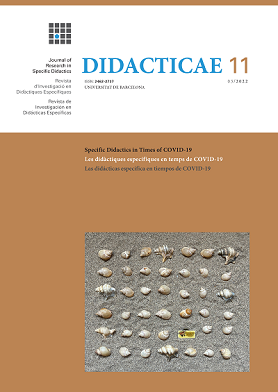Proyecto: Fundamentos de Historia - Historia Antigua y Medieval: Problemas y soluciones materiales
Project: Fundamentals of History - Ancient and Medieval History: Material problems and solutions
DOI:
https://doi.org/10.1344/did.2022.11.207-211Keywords:
higher education, didactics of Social Sciences, ancient history, teaching innovation, materials designAbstract
Fundamentals of History corresponds to a series of teaching innovation projects funded by the Vice-Rectorate for Students of the University of Seville, whose first objective was to identify the needs of students when taking the subject of the same name, introduced in the curriculum of the Primary Education Degree in 2010. Research into previous ideas and the experience of the teaching groups led to the need to respond to the problems detected through a second project, the aim of which was to design specific materials for the students of this subject, as well as for students in the first years of the History degree courses. In this contribution we present the design, development and results of the projects corresponding to the 2011-12 and 2016-17 academic years. The first is an investigation into the initial level of students through the design and application of initial assessment questionnaires and the second is a project to develop materials that culminated in the publication of the manual Fundamentals of History, Ancient and Medieval History of Spain
References
Álvarez, Melero, A., Álvarez-Ossorio, Rivas, A., Cidoncha, Redondo, F., & Sánchez Domínguez, V. (2018), El uso del Kahoot y del Jumble como herramienta de trabajo para la enseñanza para la Historia Antigua y Medieval de España. En Rodríguez López, M. y Anguita Martínez, R. Innovaciones en el aprendizaje con tecnologías digitales, 97-108. Egregius
Benito, Á., & Cruz, A. (2012), Nuevas claves para la Docencia Universitaria en el Espacio Europeo de Educación Superior. Narcea.
Carbó García, J.R. & Pérez Miranda, I. (2010), “Fuentes históricas de los juegos de rol: un experimento para la didáctica de la historia antigua” en Orejudo González, J.P. (coord.) Perspectiva educativa y cultural de “juego de rol. Education in the knowledge society (EKS). Vol. 11, nº 3. 149-167. http://campus.usal.es/~revistas_trabajo/index.php/revistatesi/ article/view/7454/7471
De Miguel, M. (2006) Metodologías de enseñanza y aprendizaje para el desarrollo de competencias. Orientaciones para el profesorado universitario ante el espacio europeo de educación superior. Alianza.
Lee, J. J., & Hammer, J. (2011) Gamification in education: What, how, why bother? Academic Exchange Quarterly, vol. 15 (2), 146–151.
Garibaldi, E., & Garibaldi, P. (2017). Ordering History Through the Timeline (No. 11202). IZA Discussion Papers.
Jiménez Hernández, D., González Ortiz, J.J. & Tornel Abellán, M. (2020). Metodologías activas en la universidad y su relación con los enfoques de enseñanza. Profesorado. Revista de Currículum y Formación de Profesorado, 24(1), 76-94. DOI: 10.30827/profesorado.v24i1.8173.
Mochocki, M. (2013). Edu-larp as revision of subject-matter knowledge. International Journal of Role-Playing, 4, 55-75.
Prieto Navarro, L. (2008) La enseñanza universitaria centrada en el aprendizaje. Estrategias para el profesorado. Octaedro.
Qian, M., & Clark, K. R. (2016). Game-based Learning and 21st century skills: A review of recent research. Computers in Human Behavior, 63, 50-58.
Downloads
Published
Issue
Section
License
Copyright (c) 2022 Víctor DSánchez omínguez, Anthony Álvarez Melero, Alfonso Álvarez-Ossorio Rivas

This work is licensed under a Creative Commons Attribution-ShareAlike 4.0 International License.
The authors who publish in this journal agree to the following terms:
- Authors retain copyright and grant the journal the right of first publication.
- Submitting a paper does not involve paying any fees.
- Texts will be published under a Creative Commons Attribution Share-Alike 4.0 International License that allows others to share the work, provided they include an acknowledgement of the work’s authorship, its initial publication in this journal and the terms of the license.
- When citing works published in Didacticae, both the autor and the journal must be cited.
- Didacticae does not accept any responsibility for the points of view and statements made by the authors.



